
curated by Katherine M. Hedeen
Reviewing poetry in translation
- recognizes translators as authors
- destabilizes narrow definitions of originality, authenticity, and authorship
- makes visible the artistry of translation
- is dissent, defiance, disobedience, subversion, solidarity
Where better than the Action Books blog to do the work?
Microreviews of poetry in translation coming at you every few months right here!
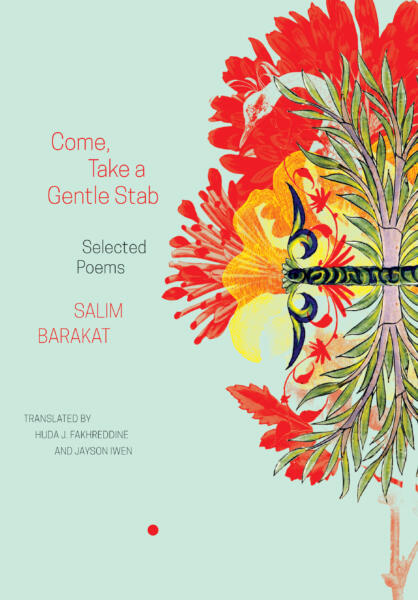 Salim Barakat. Come, Take a Gentle Stab.
Salim Barakat. Come, Take a Gentle Stab.
Translated by Huda Fakhreddine and Jayson Iwen.
Seagull Books, 2021.
110 pages. $19.00
Reading Huda Fakhreddine and Jayson Iwen’s translation of Salim Barakat, the word “direction” kept jumping out at me: “depraved directions,” “the direction of wilderness,” “a direction empty of shrapnel.” In one poem, “directions drop here, like crates of beet” and in other, “the directions became loose, only grasped in escape.” It is as though he is laying out the coordinates of a perplexingly unfamiliar, deeply personal world – one that you’re never meant to become fully oriented in because it’s always on the verge of becoming something else. One poem begs us, “after all this, do not ask me to narrate the earth, direction by direction, and the sky, bolt by bolt.” As you read on, the word “direction” itself starts to mean more—and less—than you had always assumed.
Barakat is a Kurdish-Syrian poet and novelist, born in 1951 and writing in Arabic. This is the first book-length translation to appear in English. The translators have selected poems from across his work, spanning his first publication in 1973 to his most recent in 2019. The scarcity of his work in English is not due to a marginal position in Arabic literature. He is recognized as one of the most prominent contemporary voices, with Nizar Qabbani hailing him as “Mawlana” (our master) and Adonis stating that “the Arabic language is in this Kurdish poet’s pocket.” It is because he is, quite frankly, untranslatable. His words lead in too many directions to be pinned down in another language. And yet here he is, magnificently, boldly, defiantly, in English.
The language of transgression appears frequently in assessments of Barakat’s work. He is the outsider, the invader, the non-native son who has grasped the dominant language of his country and rallied it to his own ends. Barakat himself has said, “My Arabic language enlists the Arab as a partner in my Kurdishness, a partnership in the heritage of imagination.” His poetry is populated by Kurdish people and places drawn from history, folklore, and his childhood in the northeastern city of Qamishli. Yet he has rooted into hidden corners of the Arabic lexicon to compose this world, sending his readers in after him to search through their own dictionaries.
So what does it mean to translate Barakat’s linguistic transgression into English? That takes its own boldness, and the translators have not proceeded timidly. This volume is the result of years of serious play between two poets who have taken on his dense syntax, defamiliarized lexicon, soundplay, and the possibility of felicitous misinterpretation. The result is an English that crackles on the page:
In the watermelon fields around the villages, the sky used to scatter, revealing a void canopied by cobwebs and policemen’s caps. Dinoka emerges naked, leading a pack of jackals in a direction empty of shrapnel.
Barakat forges internal resonances and rhymes that surprise and tempt and disappear, creating unexpected juxtapositions and linkages between words. And the translators have wrangled English to the same electrifying effect. Read the passage above out loud—relish in the pop of the c’s, in the disappearing and reappearing of the æ…scatter, cap…pack of jackals…shrapnel. (PBC)
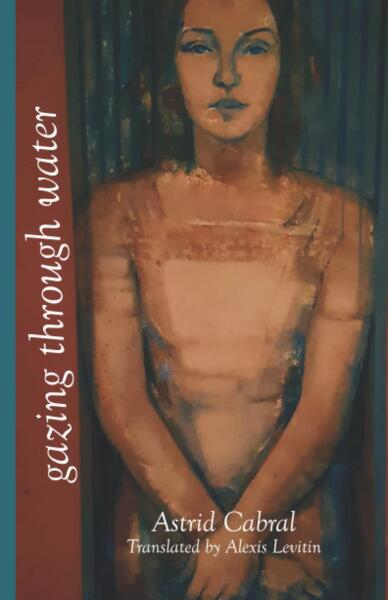 Astrid Cabral. Gazing through Water.
Astrid Cabral. Gazing through Water.
Translated by Alexis Levitin.
Aliform Publishing, 2021.
149 pages. $14.95.
Astrid Cabral is a renowned poet, short-story writer, and environmentalist from Brazil’s State of Amazonas, in the Amazon region. This is her second bilingual Portuguese/English volume of poetry, following Cage (2008), also translated by Alexis Levitin. In Gazing through Water, the Amazon River is as omnipresent as before, but the ocean and other waterways are also ubiquitous. Here, the trope of water reflects the book’s metaphysical themes—the passage of time; personal loss; the dialectics of life and death:
Who could say
why you crossed the river
when on this bank
there was leafy foliage and shade
and flowers in full splendor?
The poems in Gazing through Water are more personal than in Cage, showing glimpses of places and people from the poet’s childhood; mourning the untimely death of her son; and speaking of the universal struggle with ageing and mortality:
In life, there is no going back.
What’s left is an entourage of shadows
and a tottering song
piercing the breast:
a sword, a blood-red sword
thrust in and stuck askew.
Cabral depicts pain, sorrow, and the anticipation of death with rare artistry, a serene voice, and the musicality of unexpected alliterations, as in “Tottering Song”: “A vida não tem volta. / Sobra o séquito de sombras…”. But if the English language doesn’t always allow for equivalent alliterations, Levitin creates his own and surprises the reader with rich imagery, equally impactful and delicate:
An indelible tattoo in me:
no simple spot, no stain on cloth or skin
but on the soul, that hidden flesh. . .
There is a fainting green of branches
the pitch-black blackness of a starless night
red bleeding into amaranth. . .
Levitin’s adept translation redoubles the gift of Cabral’s poetry; in each poem we “see” the poet, but also the translator, only to find in their endeavor the face of our very own humanity:
Have you ever seen a bird
with roots?
Have you ever seen a tree
with wings?
Have you ever seen a fish
with a voice?Look at me.
(CPB)
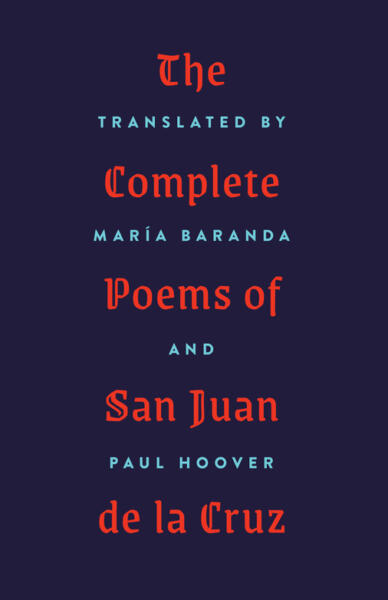 San Juan de la Cruz. The Complete Poems of San Juan de la Cruz.
San Juan de la Cruz. The Complete Poems of San Juan de la Cruz.
Translated by María Baranda and Paul Hoover.
Milkweed Editions, 2021.
143 pages. $18.00.
Priest, mystic, and poet San Juan de la Cruz (1542-1591) caused uproar in the church, was imprisoned, escaped from prison, and wrote several controversial poems inspired by the “Song of Songs,” broadly understood as the sexiest part of the Bible, transposing the relationship between God and the Church onto the relationship between lover and beloved.
These sixteenth-century poems are gathered together and given a new, contemporary voice through poets María Baranda and Paul Hoover’s co-translation, published as a bilingual edition. In the Translators’ Note, Baranda and Hoover are explicit about their approach. While “in Spanish, [the poems] are capable of being sung in the street,” these versions discard rhyme, and instead aim to maintain theology and imagery above all else. Rather than twist the text to recreate sound or rhythm, Baranda and Hoover peel back the poems to clearly reveal the specific ideas and images within them. This is the liberatory power of retranslating classic poets: the opportunity to read differently, on top of or alongside other readings—to provide new shades of meaning, and allow other elements of the poems to shine through.
Like much devotional poetry, the erotic undercurrents are near-constant and in this case, made crystal clear by Baranda and Hoover. The Creator “inside and loving the Beloved,” “God cried and moaned / there in the manger,” the soul “aches” to see God? Okay, I’m interested. “Dark Night,” perhaps the most well-known of San Juan’s poems, is particularly fascinating (considering the historical context) given its homoeroticism, the overlap between the poet seeking God and a male-coded lover:
In the blissful night,
in secret, where no one could see me,
nor could I see a thing,
with neither light nor guide,
except the one who burned in my heart.This is what guided me
more truly than the light of noon,
where he awaited me
The theme pulsing at the core of the Complete Poems is the act of searching—for God, for understanding, for wisdom, for a lost lover, for all of the above conflated into one search for meaning, without ever attaining what it sought—“that not knowing is knowing/ going beyond all knowledge.” In this sense, the poems ultimately center desire in its many forms; it is desire itself—the reveling in the unknown, in the search—that is most desired. Through retranslation, the search continues. (GM)
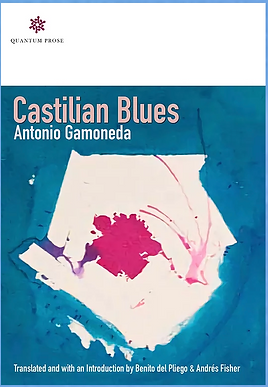 Antonio Gamoneda. Castilian Blues.
Antonio Gamoneda. Castilian Blues.
Translated by Benito del Pliego and Andrés Fisher.
Quantum Prose, 2021.
112 pages. $19.00.
Antonio Gamoneda’s Castilian Blues, translated by Benito del Pliego and Andrés Fisher, endured twelve years of painful silence before its first publication. Originally written between the years 1961 and 1966, Gamoneda’s poems explore the brutality of working-class Spanish life under the Franco dictatorship. His poems contain thinly veiled atheist messages and draw on communist ideology, oftentimes adding epigraphs from Karl Marx and Henri Lefebvre. Unsurprisingly, the Francoist censorship regime purged Castilian Blues of all political messages and references to the miserable existence under Catholic rule. Gamoneda chose to reject the censored changes which were required for his work’s publication, protecting his art from the very forces he wrote against. The full collection was finally released in 1982, seven years after the dictator’s death.
In a way, the publication process of Castilian Blues reflects the subject matters of the poems themselves: dictatorial control, years of waiting, long stretches of time where nothing changes. The poem “Twenty Years Later” describes the narrator at fourteen working in the fields: “I was a young man that loved the sun and the land/and the shouting of my comrades in the woods.” However, as the boy in the poem grows older, he realizes he cannot escape from the unforgiving toils of labor. There is no freedom to be found in Spain’s “gnawed soil” and “scorched land.” Later in the poem, Gamoneda writes, “Twenty years. I’ve been scorned and forgotten.” These poems, stark and beautiful, are a record of his existence.
As the title suggests, Castilian Blues was influenced by the African-American musical tradition and the process by which it attempts to find solace in suffering. Lyricism, musicality, and repetition are prominent features of the collection, though hiding in the seemingly simple stanzas are moments of revelation. Gamoneda often disrupts the rhythm of a poem with an intentional grammatical misstep, striking the wrong note to draw attention to his message. Del Pliego and Fisher utilize a literal translation rather than smoothing over these unusual decisions about syntax. In doing so they maintain a “foreignness” in the text which mirrors Gamoneda’s experience of translating blues music in English into Spanish.
At a time when Franco’s Spain represented “a closed door” between the world and its people, Gamoneda’s unprecedented internationalism sought to forge connections between countries and cultures. The collection also concerns itself with the stories of strangers, the person one passes on the street or works with in the field. Those who come from different places but yearn for the same freedom. In “A Train over the Land,” the lyrical voice gracefully observes the three people sitting with him in a train compartment. One woman rests “swollen with sadness.” Another man “unwraps a bit of fruit and chews it slowly.” In a seemingly mundane if not depressing moment, Gamoneda exposes each passenger’s humanity and reaches out a hand in solidarity. He leaves the reader with this uncertain yet hopeful image.
Now we are in peace in the compartment.
I feel myself going home and each one feels they’re leaving or returning.The train moves forward beneath the night.
We’re crossing the land together.
(RB)
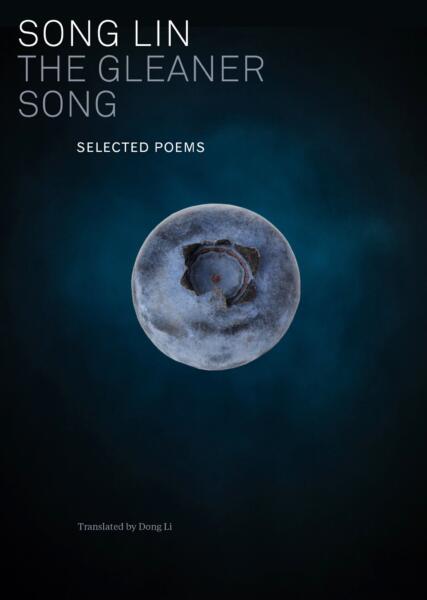 Song Lin. The Gleaner Song.
Song Lin. The Gleaner Song.
Translated by Dong Li.
Deep Vellum, 2021.
138 pages. $15.95.
Song Lin’s poetry carries a yearning for a different time and a different place. The Gleaner Song is a bilingual collection excerpted from forty years of poetry and Song’s first book published in English, translated by Dong Li. The Gleaner Song begins with its titular poem. Setting the stage for the book, “The Gleaner Song” gains nuance with each reading, and has an echoing profundity in its narrative and imagery.
Do you remember? Those two bright syllables
turned us into blue ghosts. Even the wind blued
a wild children’s song: “radar soldier, radar soldier from the sky”
until the moon rose in midautumn, the wooden carriage slid,
berries crushed, as if blood from a wound, as if to dye
my manuscripts so they read with that kind of blue.
The “two bright syllables” refer to the Chinese word for blueberries, as explained in a rare footnote. They condemn the speaker to ghosthood and to the night of autumn from the nostalgic blueberry-filled summer. With playful neologisms like “blued,” Song creates images by seeing the ordinary in strange and evocative ways, like the blueberry on the cover of the book.
Li’s translations are masterful. The way he crafts Song’s poems have moments of beauty and tension that make you hold your breath until you get from the end of one line to the beginning of the next. Song and Li collaborated in selecting the poems for this collection, and are friends beyond their work together. One of Song’s poems is dedicated to Li, and others are either dedicated to or named after other artists and changemakers. Song’s poetry sits at the intersection of art, politics, and philosophy, easily coexisting in all of those fields. Song’s own history of leading student protests in Shanghai after the Tiananmen Square Massacre, his subsequent imprisonment, his exiled life in France, Singapore, and Argentina, and his return to China shaped his use of poetry as a political tool, but it is the artistry with which he writes about his political and philosophical reflections that make this book memorable. In “Providence and Prophecy,” dedicated to Shi Tao, a Chinese journalist and poet imprisoned for leaking a document from the Chinese Communist Party, Song writes:
However it is right here that a fact has been overlooked;
between death in a foreign town and waiting for execution
the unsaid sacrifice is survival.
From Song’s own physical exile to Shi’s exile through imprisonment, Song navigates a complex political and social world with grace and deftness. In The Gleaner Song, Song complicates homogeneous views of any one country, and ties together places and traditions that he’s seen throughout his life in exile. His range of poems and topics seem to come from many perspectives that all unify in his singular voice. (CA)
 Lao Yang. Pee Poems.
Lao Yang. Pee Poems.
Translated by Joshua Edwards and Lynn Xu.
Circumference Books, 2022.
135 pages. $18.00
In his provocatively—yet delightfully—titled collection Pee Poems, Lao Yang hurls his poetics outright. “Don’t call me a poet,” he writes, “call me a piss person. Like a ‘juicy meatball,’ bursting suddenly in the mouth and spilling out: piss person” (emphasis in original). Anthropologist Mary Douglas’ seminal formulation of dirt as ‘matter out of place’ feels appropriate here, for Yang’s self-disclosure as a piss person challenges the perverse abjection of our bodily expulsions. Sure, urination is a natural function, despite the fact we displace its processes from public view, but as Yang notes, it is also a political act. Indeed, Yang’s status as a piss person not only underscores the socio-political conditions attached to the body’s excesses, but urination is also an extension of a wider political ecology, where ideas of freedom and autonomy are often contested subjects. “When even the right to cry is denied,” he writes, “Incontinence is one of the few remaining liberties.” Far from being matter of place, Yang insists on staging the politics of waste in full view to disrupt the boundaries between the body and the body politic. Case in point is the following poem, where the anaphora accumulates a steady stream of political barbarities and contaminations:
Into baby formula add kidney stones
Into the vaccine mix side effects
Into real estate put human flesh
Into steamed buns stuff politics………
Into your tears mix cement
Into your head add shit
Yet what makes this collection so compelling is not only the poet’s political insistences nor the poems’ curious embodiments, but their rather playful ambitions. While the collection is composed of aphorisms and reflections that encapsulate the poet’s commitment to careful observation of everyday life’s excesses, the poems are held together by their humour that shake the absurdity of life’s restlessness. “I’m so ridiculous,” notes the poet,
In the end, I only made a hole in the ground
That’s the size of myself.
Perhaps we can find true freedom in humour and waste, although as the poet reminds us, nothing is black or white. This collection embeds ambiguity into its syntaxes. (And what is more ambiguous than the space where politics foreclose art’s potential?) The world is beautiful, says the poet, and it’s full of shit too:
If the world is in a blossom, then it’s in spit and shit too.
You love to pick flowers, I silently suppress a turd.
(OT)
Clara Altfeld is an education coordinator in Austin, Texas.
Rose Bialer is the Assistant Interviews Editor for Asymptote. She teaches English in Madrid, Spain.
Phoebe Bay Carter is a translator from Arabic and Spanish and a PhD student in Comparative Literature at Harvard University. She is currently translating a chapter a week for a serialized novel-in-translation at kafkaintangier.com @phoebebaycarter
Gabriella Martin is a translator and scholar based at Aarhus University in Denmark. She holds a PhD in Hispanic Studies from Washington University in St. Louis. @holygabymartin
Cristina Pinto-Bailey is a Brazilian writer, scholar, and translator living in Virginia. Her essays and literary translations appear in Review: Literature and Arts of the Americas, Romance Quarterly, Afro-Hispanic Review, Witness, and other venues. She is the translator of Maria Firmina dos Reis’s 1859 abolitionist novel Ursula (Tagus Press, 2021).
Orchid Tierney is the author of a year of misreading the wildcats (The Operating System, 2019). She is an assistant professor of English at Kenyon College. www.orchidtierney.com @OrchidTierney